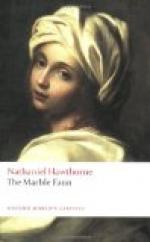At last, deeming it full time for Miriam to keep her tryst, he climbed to the tiptop of the tallest tree, and thence looked about him, swaying to and fro in the gentle breeze, which was like the respiration of that great leafy, living thing. Donatello saw beneath him the whole circuit of the enchanted ground; the statues and columns pointing upward from among the shrubbery, the fountains flashing in the sunlight, the paths winding hither and thither, and continually finding out some nook of new and ancient pleasantness. He saw the villa, too, with its marble front incrusted all over with basreliefs, and statues in its many niches. It was as beautiful as a fairy palace, and seemed an abode in which the lord and lady of this fair domain might fitly dwell, and come forth each morning to enjoy as sweet a life as their happiest dreams of the past night could have depicted. All this he saw, but his first glance had taken in too wide a sweep, and it was not till his eyes fell almost directly beneath him, that Donatello beheld Miriam just turning into the path that led across the roots of his very tree.
He descended among the foliage, waiting for her to come close to the trunk, and then suddenly dropped from an impending bough, and alighted at her side. It was as if the swaying of the branches had let a ray of sunlight through. The same ray likewise glimmered among the gloomy meditations that encompassed Miriam, and lit up the pale, dark beauty of her face, while it responded pleasantly to Donatello’s glance.
“I hardly know,” said she, smiling, “whether you have sprouted out of the earth, or fallen from the clouds. In either case you are welcome.”
And they walked onward together.
CHAPTER IX
THE FAUN AND NYMPH
Miriam’s sadder mood, it might be, had at first an effect on Donatello’s spirits. It checked the joyous ebullition into which they would otherwise have effervesced when he found himself in her society, not, as heretofore, in the old gloom of Rome, but under that bright soft sky and in those Arcadian woods. He was silent for a while; it being, indeed, seldom Donatello’s impulse to express himself copiously in words. His usual modes of demonstration were by the natural language of gesture, the instinctive movement of his agile frame, and the unconscious play of his features, which, within a limited range of thought and emotion, would speak volumes in a moment.
By and by, his own mood seemed to brighten Miriam’s, and was reflected back upon himself. He began inevitably, as it were, to dance along the wood-path; flinging himself into attitudes of strange comic grace. Often, too, he ran a little way in advance of his companion, and then stood to watch her as she approached along the shadowy and sun-fleckered path. With every step she took, he expressed his joy at her nearer and nearer presence by what might be thought an extravagance




